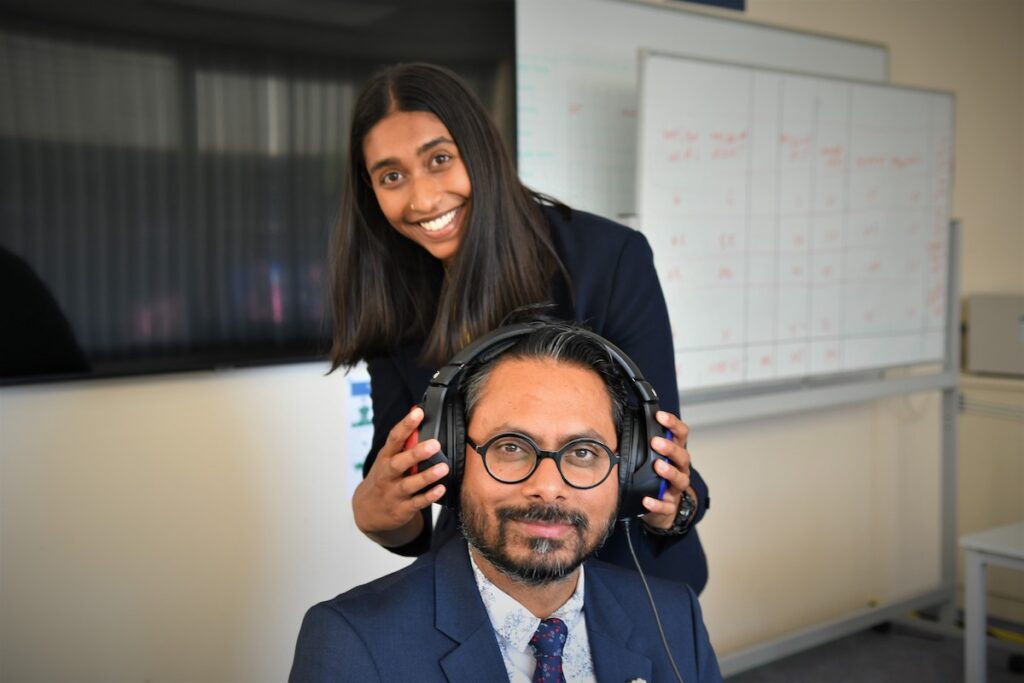Today is World Hearing Day, a timely reminder that many Australians live with debilitating hearing impairments that receive relatively little attention and research.
One in six Australians suffer from chronic tinnitus, yet research into solutions is relatively limited. Flinders University defines tinnitus as a “debilitating and irreversible hearing ailment characterised by unceasing ringing in the ears”.
Dr Dee Domingo, from the Flinders University Audiology Department, is doing research into this relatively understudied field, to understand how sufferers fared during the COVID-19 lockdowns.
“This is a hidden disease and, because it’s not visible, many people simply don’t know it exists, yet it deserves our full attention and focus,” says Dr Domingo.
“We’re trying to find the neural networks that underlie tinnitus and use that information to inform new treatments or therapy options. This is the area that hasn’t been plumbed enough.
“It’s the type of disease that is hard to understand if someone hasn’t experienced it, which is why we are going directly to patients for their involvement, to best understand their ongoing problems with tinnitus.”
Read more: What’s that high-pitched whine? When tinnitus strikes
Dr Domingo is working alongside Professor Raj Shekhawat, leader of the International Discovery Research Grant funded by the Royal National Institute of the Deaf, on a three-year-long project investigating the use of non-invasive brain simulants to assist tinnitus management.

A preliminary survey in conjunction with Professor Bamini Gopinath is being undertaken to assess how sufferers coped with the condition during lockdown.
“Many people with tinnitus were living alone with this constant audio annoyance, and without other distractions during lockdown it would have been at the forefront of their thinking at every waking moment,” says Dr Domingo. “When you have nothing else to distract you, the noise produced by tinnitus becomes most bothersome, especially when you are attempting to get to sleep. It became their primary focus, and it loomed large as the most upsetting part of their life – at worst, it has developed into a mental health problem. Our survey needs to understand the true depth of this situation.”
The key to the survey, which Dr Domingo expects to have completed by the end of the year, is making tinnitus sufferers active participants in the research process by highlighting the voice of patients in the research. “We have to have a holistic view to move forward with tinnitus treatment, to stop people from feeling as though they are dealing with this condition in isolation. Information is power.”
Read more: Around 1.3. Aussies living with preventable hearing loss
Prof. Shekhawat says that conquering tinnitus is more important than most people realise and aims to draw attention to the condition and the need for solutions.
“Tinnitus is not a disease, but an associated symptom – and in 99.9 per cent of circumstances it is inflicted damage that triggers tinnitus. It is not just going to happen of its own accord,” says Prof. Shekhawat. “It can be self-inflicted, through exposure to extreme loud music, for example, or industrial noise – and that once the tiny hairs on the cochlear in the inner ear are damaged, even the slightest bit, they can never be regenerated. It is a sense lost forever – and that changes people’s perception once they understand that.
“When a baby is conceived, the first sensory system to develop is hearing. Our abilities with language are all related to our hearing. If your hearing is not functioning, you won’t develop speech and language, then think about the implication on your education, your vocation and social development. Yet it’s only people who suffer hearing problems [who] ever come to truly understand all this.”
Dr Domingo and Prof. Shekhawat’s research into neural networks may provide key findings that bring the medical community closer to conquering tinnitus.
“Tracking the neural networks will finally give us a visual representation of how tinnitus occurs and the damage it inflicts – and these visuals will help more people understand and appreciate the disease,” says Dr Domingo. “It will paint a literal picture of what causes it, and that’s the first step on the path to finding solutions.”
Read more: How to tackle tinnitus
Do you or someone you know suffer from tinnitus? Did lockdown change your experience of tinnitus or your ability to manage the symptoms?
If you enjoy our content, don’t keep it to yourself. Share our free eNews with your friends and encourage them to sign up.
Disclaimer: This article contains general information about health issues and is not advice. For health advice, consult your medical practitioner.

